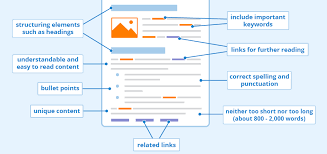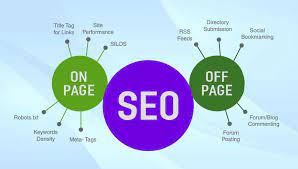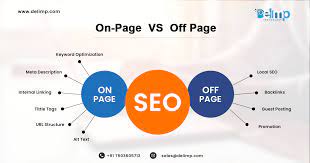The Importance of On-Page Optimization in SEO
When it comes to Search Engine Optimization (SEO), on-page optimization plays a crucial role in determining the visibility and ranking of your website on search engine results pages. In simple terms, on-page optimization refers to the practice of optimizing individual web pages to improve their relevance to specific keywords and increase their organic traffic.
Key Elements of On-Page Optimization
There are several key elements that make up effective on-page optimization:
- Keyword Research: Identifying relevant keywords that your target audience is searching for is the first step in on-page optimization. These keywords should be strategically placed in your content to improve its visibility.
- Meta Tags: Title tags, meta descriptions, and meta keywords are essential meta tags that provide search engines with information about your webpage. Optimizing these tags with relevant keywords can improve click-through rates.
- Content Quality: High-quality, relevant, and engaging content is key to on-page optimization. Content should be informative, well-structured, and include targeted keywords naturally within the text.
- URL Structure: Creating SEO-friendly URLs that are descriptive and contain relevant keywords can help search engines understand the content of your webpage better.
- Internal Linking: Linking between pages within your website helps search engines navigate and index your site more effectively. Internal links also improve user experience by guiding visitors to related content.
- Image Optimization: Optimizing images with descriptive filenames, alt text, and captions can enhance the accessibility of your content for search engines and visually impaired users.
The Benefits of On-Page Optimization
Effective on-page optimization offers a range of benefits for your website:
- Improved Search Engine Rankings: By optimising individual web pages for specific keywords, you increase the likelihood of ranking higher in search engine results pages (SERPs).
- Enhanced User Experience: Well-structured content with relevant information not only attracts search engines but also engages visitors and encourages them to spend more time on your site.
- Increase in Organic Traffic: Targeted keyword placement and other on-page optimization techniques can drive more organic traffic to your website from users actively searching for related topics.
- Better Conversion Rates: When users find what they’re looking for easily on your website due to effective on-page optimization, they are more likely to convert into leads or customers.
In Conclusion
In conclusion, on-page optimization is a fundamental aspect of SEO that cannot be overlooked. By focusing on key elements such as keyword research, meta tags, content quality, URL structure, internal linking, and image optimization, you can enhance the visibility, relevance, and user experience of your website. Implementing effective on-page optimization strategies will not only boost your search engine rankings but also drive organic traffic and improve conversion rates. Invest time and effort into optimising your web pages today to reap long-term benefits tomorrow!
Maximising Website Success: Six Key Benefits of On-Page Optimisation
- Improved search engine rankings
- Enhanced user experience
- Increased organic traffic
- Better conversion rates
- Cost-effective marketing strategy
- Greater control over website content
Challenges of On-Page Optimisation: Navigating Time, Complexity, and Competition
- Time-Consuming
- Constant Updates
- Technical Knowledge Required
- Competitive Landscape
- Risk of Over-Optimization
- Limited Scope
- Resource Intensive
Improved search engine rankings
One significant benefit of on-page optimization is the improvement in search engine rankings that it can bring. By strategically optimizing individual web pages with relevant keywords, meta tags, high-quality content, and other key elements, websites have a higher chance of ranking higher in search engine results pages (SERPs). This enhanced visibility can lead to increased organic traffic, better user engagement, and ultimately, greater online success for businesses and individuals striving to establish a strong digital presence.
Enhanced user experience
Enhanced user experience is a significant benefit of on-page optimization. By structuring content in a clear and engaging manner, incorporating relevant information, and guiding visitors with internal links, websites can provide a seamless and enjoyable browsing experience for users. When visitors can easily find what they are looking for and navigate through a website effortlessly, they are more likely to stay longer, explore more pages, and ultimately convert into leads or customers. Prioritising user experience through on-page optimization not only improves engagement and satisfaction but also contributes to building a loyal audience base.
Increased organic traffic
One of the key advantages of on-page optimization is the significant increase in organic traffic that it can bring to your website. By strategically incorporating relevant keywords, optimizing meta tags, and creating high-quality content, you can attract more visitors who are actively searching for information related to your offerings. This targeted approach not only boosts your search engine rankings but also drives more qualified traffic to your site, ultimately leading to higher engagement and potential conversions.
Better conversion rates
Effective on-page optimization leads to better conversion rates by ensuring that your web pages are structured and optimised in a way that guides visitors towards taking desired actions, such as making a purchase, filling out a contact form, or subscribing to a newsletter. By providing relevant content, clear calls-to-action, and a seamless user experience, on-page optimization increases the likelihood of turning website visitors into valuable leads or customers. This ultimately results in improved conversion rates and maximises the return on investment for your digital marketing efforts.
Cost-effective marketing strategy
One significant advantage of on-page optimization is its cost-effectiveness as a marketing strategy. Unlike paid advertising or other forms of marketing that require continuous investment, on-page optimization focuses on improving the organic visibility and ranking of your website without incurring ongoing expenses. By strategically optimising your web pages with relevant keywords, meta tags, and high-quality content, you can attract targeted organic traffic over time, resulting in long-term benefits and a higher return on investment. This sustainable approach to digital marketing not only saves costs but also delivers consistent results by enhancing your online presence without the need for constant financial outlay.
Greater control over website content
One significant advantage of on-page optimization is the greater control it offers over website content. By strategically incorporating targeted keywords, optimizing meta tags, and structuring content effectively, website owners can tailor their pages to align with their specific goals and target audience. This level of control allows for the creation of engaging and relevant content that not only appeals to search engines but also enhances the overall user experience. With on-page optimization, website owners can fine-tune their content to reflect their brand identity and messaging, ultimately leading to improved visibility and engagement with their online audience.
Time-Consuming
One significant drawback of on-page optimization is its time-consuming nature. To execute this process effectively, meticulous attention to detail is essential, from conducting thorough keyword research to crafting high-quality content and optimising meta tags. Each step demands careful consideration and implementation, which can consume a considerable amount of time. Balancing the need for precision with the demands of other aspects of website management can be challenging, making on-page optimization a labour-intensive task that requires patience and dedication.
Constant Updates
One significant drawback of on-page optimization is the need for constant updates. Search engine algorithms are known to undergo frequent changes, requiring website owners to stay abreast of these updates and adjust their on-page optimization strategies accordingly. This continuous need for adaptation can be time-consuming and resource-intensive, as failing to update your optimization efforts may result in a decline in search engine rankings and visibility. Keeping up with the ever-evolving algorithms to ensure optimal on-page optimization can pose a challenge for businesses striving to maintain their online presence and competitive edge in the digital landscape.
Technical Knowledge Required
For beginners, one significant drawback of on-page optimization is the technical knowledge required to implement SEO best practices effectively. Understanding the intricacies of on-page optimization, such as keyword placement, meta tags, URL structure, and internal linking, can be daunting for those new to the field. Navigating the technical aspects of SEO and staying updated with ever-evolving algorithms and trends can pose a steep learning curve. Without a solid grasp of these technical elements, beginners may struggle to optimise their web pages efficiently and may find it challenging to compete in the competitive online landscape.
Competitive Landscape
In the ever-evolving digital landscape, the competitive nature of online businesses poses a significant challenge to relying solely on on-page optimization for achieving top rankings. With a multitude of competitors vying for visibility and engagement, standing out through on-page strategies alone can prove to be an uphill battle. As the competition intensifies, diversifying SEO efforts beyond on-page optimization becomes crucial to maintain a competitive edge and secure prominent positions in search engine results.
Risk of Over-Optimization
One significant con of on-page optimization is the risk of over-optimization. When website owners excessively use keywords or employ other optimization techniques in an attempt to manipulate search engine rankings, they run the risk of facing penalties from search engines. Search engines like Google continuously update their algorithms to ensure that websites providing valuable and user-friendly content are rewarded, while those engaging in manipulative practices are penalized. Over-optimization can result in a drop in rankings or even complete removal from search engine results pages, ultimately harming the website’s visibility and credibility. Striking a balance between optimization and natural, high-quality content is crucial to avoid falling victim to penalties and maintaining a strong online presence.
Limited Scope
A notable drawback of on-page optimization is its limited scope, as it primarily concentrates on enhancing individual web pages and may overlook broader SEO strategies like off-page factors. While on-page optimization is crucial for improving the relevance and visibility of specific pages, it may not fully address the external factors that influence a website’s overall search engine ranking. Off-page elements such as backlinks, social signals, and domain authority play a significant role in SEO success, highlighting the importance of a holistic approach that encompasses both on-page and off-page optimization strategies for optimal results.
Resource Intensive
One notable drawback of on-page optimization is its resource-intensive nature. Implementing thorough on-page optimization strategies often demands a substantial allocation of resources, including manpower and specialised tools. The process of conducting keyword research, creating high-quality content, optimizing meta tags, structuring URLs, and managing internal linking can be time-consuming and labour-intensive. Moreover, investing in advanced SEO tools and technologies to streamline the optimization process further adds to the resource burden. As a result, organisations must carefully weigh the costs and benefits of on-page optimization to ensure a judicious allocation of resources for optimal results.




